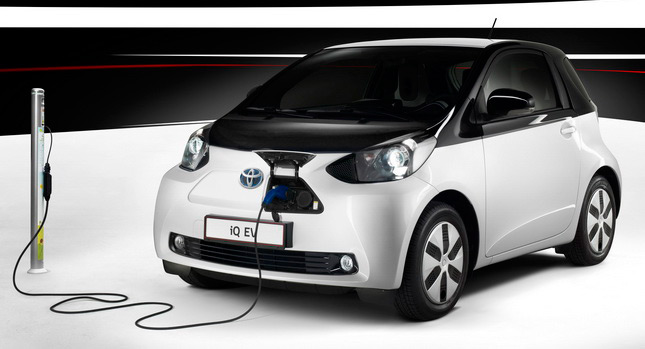While electric vehicles may not yet have substantial range to be as versatile as hybrids or internal-combustion engine models, if the their use is confined in daily commute in cities, theoretically then, their range is more than enough to satisfy most drivers’ needs.
The iQ city car (sold under the Scion nameplate in North America) is designed specifically designed to be used in an urban environment. Prototypes were displayed at both the 2011 Tokyo Motor Show in the form of the FT-EV III concept and this year’s Geneva Auto Show. Now Toyota has officially revealed a plug-in all-electric variant – but it will not enter full production.
Despite initial projections of a normal production rate, Toyota has revised its original plans stating that EV’s limited range and lack of infrastructure means hybrid and plug-in hybrid electric (PHEV) models is still the way to go.
“The current capabilities of electric vehicles do not meet society’s needs, whether it may be the distance the cars can run, or the costs, or how it takes a long time to charge”, Takeshi Uchiyamada, Toyota’s vice chairman and the engineer who oversees vehicle development, told reporters today, according to Automotive News.
Thus, Toyota will concentrate its efforts on hybrids and will produce only 100 units of the iQ EV that will be sold exclusively in Japan and the U.S.
The zero-emissions version of the Toyota‘s city car is powered by a new development of the Hybrid Synergy Drive. It comprises a electric motor with 47kW (63HP) and 163Nm (120 lb-ft) of torque, a 12.0 kWh, 277.5V battery pack, a 3kW water-cooled battery charger, a DC/DC converter, an inverter, a motor speed reduction mechanism and a regenerative braking system.
According to the Japanese automaker, the iQ EV accelerates from standstill to 100 km/h (62 mph) in 14.0 seconds and reaches a maximum speed of 125 km/h (78 mph). Its NEDC-certified range is 85 km (53 miles)
The iQ EV offers three modes of operation, selectable by the gear shift lever: D-range for minimum energy consumption, S-charge for maximum performance and B-range for maximum regenerative braking to extend the iQ’s range as far as possible.
Fully charging the battery pack takes approximately 3 hours from a 230V home outlet, while a rapid charger-compliant port enables an 80 percent charge in just 15 minutes.
The compact lithium-ion battery is placed within a high-strength cradle under the cabin floor, in the place occupied otherwise by the conventionally powered versions’ exhaust system. Thus, it has no impact on interior space, which remains practically the same.
Dimensions are almost identical, with the EV sharing the 1,680 mm width, 1,505 mm height and 2,000 mm wheelbase with the iQ’s existing versions. Only its total length has been increased by 135 mm, though the 4.1 turning circle maintains the city cars maneuverability.
In order to minimize the weight increase that inevitably comes with the electric powertrain and battery pack, the iQ EV makes extensive use of high tensile sheet steel in its body construction, and as a result, it is only 125 kg (275 pounds) heavier.
The car’s aerodynamics have also been optimized to cut energy consumption. Air inlets have been reduced to a minimum, the bonnet has been redesigned to optimize airflow, the roof rear edge has been angled and the rear pillar, quarter window glass and molding have been reshaped. Moreover, the underbody covers along with the battery pack create a flat surface, further improving aerodynamic efficiency.
Up front, the upper grill has been removed and replaced by the charging port to the left of the Toyota badge, where it is more convenient to attach a cable to charging stations.
The iQ EV also sports a new headlamp design with gloss-black extension air vents for battery, LED daytime running lights and a two-tone paint, with the upper part color finished in black and the lower in white. There are also new alloy wheels and at the rear, a LED lamp design above the license plate within the bumper.
By Andrew Tsaousis
PHOTO GALLERY
















